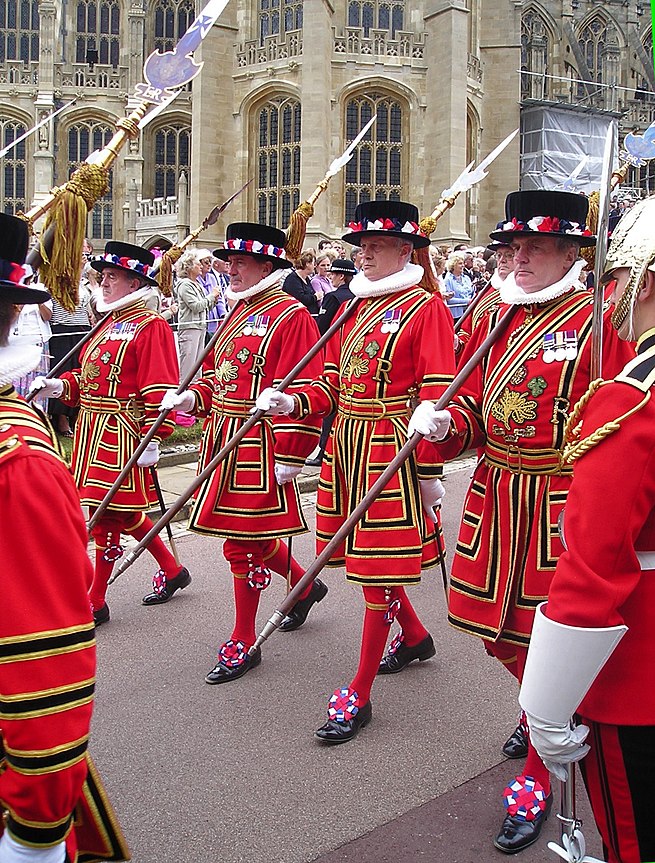
Main Difference
The main difference between Livery and Uniform is that the Livery is a uniforms worn by servants or other classes of people and Uniform is a similar clothing worn by a group of people
-
Livery
A livery is a uniform, insignia or symbol adorning; in a non-military context, a person, an object or a vehicle that denotes a relationship between the wearer of the livery and an individual or corporate body. Often, elements of the heraldry relating to the individual or corporate body feature in the livery. Alternatively, some kind of a personal emblem or badge, or a distinctive colour, is featured.
The word itself derives from the French livrée, meaning dispensed, handed over. Most often it would indicate that the wearer of the livery was a servant, dependant, follower or friend of the owner of the livery, or, in the case of objects, that the object belonged to them.
In the late medieval phenomenon of bastard feudalism, livery badges worn by the “retainers” of great lords, sometimes in effect private armies, became a great political concern in England.
-
Uniform
A uniform is a type of clothing worn by members of an organization while participating in that organization’s activity. Modern uniforms are most often worn by armed forces and paramilitary organizations such as police, emergency services, security guards, in some workplaces and schools and by inmates in prisons. In some countries, some other officials also wear uniforms in their duties; such is the case of the Commissioned Corps of the United States Public Health Service or the French prefects. For some organizations, such as police, it may be illegal for non members to wear the uniform.
-
Livery (noun)
Any distinctive identifying uniform worn by a group, such as the uniform worn by chauffeurs and male servants.
-
Livery (noun)
The whole body of liverymen, members of livery companies.
-
Livery (noun)
The paint scheme of a vehicle or fleet of vehicles.
“The airline’s new livery received a mixed reaction from the press.”
-
Livery (noun)
A taxicab or limousine.
-
Livery (noun)
The delivery of property from one owner to the next.
-
Livery (noun)
The writ by which property is obtained.
-
Livery (noun)
The rental of horses or carriages; the rental of canoes; the care and/or boarding of horses for money.
-
Livery (noun)
A stable that keeps horses or carriages for rental.
-
Livery (noun)
An allowance of food; a ration, as given out to a family, to servants, to horses, etc.
-
Livery (noun)
Release from wardship; deliverance.
-
Livery (noun)
A low grade of wool.
-
Livery (noun)
Outward markings, fittings or appearance
-
Livery (verb)
To clothe.
“He liveried his servants in the most modest of clothing.”
-
Livery (adjective)
Like liver.
-
Livery (adjective)
Queasy, liverish.
-
Uniform (adjective)
Unvarying; all the same.
-
Uniform (adjective)
Consistent; conforming to one standard.
-
Uniform (adjective)
with speed of convergence not depending on choice of function argument; as in uniform continuity, uniform convergence
-
Uniform (adjective)
Composed of a single macromolecular species.
-
Uniform (adjective)
(of a polyhedron) That is isogonal and whose faces are regular polygons; (of an n-dimensional (n>3) polytope) that is isogonal and whose bounding (n-1)-dimensional facets are uniform polytopes.
-
Uniform (noun)
A distinctive outfit that serves to identify members of a group.
-
Uniform (noun)
Phonetic equivalent for the letter U in the ICAO spelling alphabet, informally known as the NATO phonetic alphabet.
-
Uniform (noun)
A uniformed police officer (as opposed to a detective).
-
Uniform (verb)
To clothe in a uniform.
